De Canadese schrijfster Chrystine Brouillet werd geboren op 15 februari 1958 in Loretteville, Quebec. Zie ook alle tags voor Chrystine Brouillet op dit blog.
Uit: Chère voisine
„Louise était déjà réveillée quand le réveil sonna. Puisque c’était lundi. Le lundi, le mercredi, le jeudi, le vendredi et le dimanche, ses chats la réveillaient vers six heures et demie. Juste avant la sonnerie. Les chats devaient probablement la réveiller les autres jours, mais elle se rendormait aussitôt sachant qu’elle n’allait pas travailler. C’était agréable comme première sensation dans une journée que la caresse d’une patte de velours sur sa joue; Mozart s’étirait, s’étirait sur le bord du lit, lui touchait le visage ou le bras. Louise laissait souvent pendre un bras hors des couvertures. Le chat s’exécutait sous l’oeil attentif de Tia Maria ou Rose ou Minette; elle n’avait pas encore choisi définitivement le nom de la chatte. Ils miaulaient en choeur. Leur maîtresse se levait, trébuchait souvent sur le tapis ou sur le téléphone, se dirigeait au radar dans la cuisine où, même si l’odeur l’écoeurait, elle ouvrait une boîte de nourriture pour chats. Au moins, à Noël, elle avait reçu en cadeau un ouvre-boîte électrique, c’était moins déprimant que de se battre avec un ouvre-boîte manuel qui n’ouvrait même pas tout compte fait. Elle écartait les chats du bout de ses pieds nus; le même drame avait lieu chaque matin, ils se précipitaient comme si ça faisait vingt-cinq mille jours qu’ils n’avaient pas mangé. C’était assez impatientant. Puis Louise allait se recoucher dix minutes. Jouissant et désespérant à la fois de ces derniers instants de sommeil. Pas de vrai sommeil, de rêve plutôt. Il faisait toujours beau dans ses rêves.“
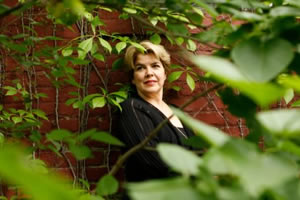
De Duitse dichter en schrijver Hans Kruppa werd geboren op 15 februari 1952 in Marl. Zie ook alle tags voor Hans Kruppa op dit blog.
Im Mondlicht
Wir gingen langsam
im Mondlicht über die Hügel.
Das Rauschen des Meeres
drang zu uns hinauf,
der prächtige Sternenhimmel
verzauberte unsere Schritte,
die Sommerluft duftete
nach purem Leben.
Ich habe dir nicht gesagt,
daß ich mich
wie neugeboren fühlte,
daß ich glücklich war.
Ich habe geschwiegen
und ich werde immer schweigen,
wenn ich an diese Nacht denke.
Ich werde die Augen schließen,
das Zirpen der Grillen hören
und deine Hand in meiner fühlen.
Flüsternde Blätter
Schattenspendender Baum,
schmeichelndes Sonnenlicht.
Blätter flüstern im Wind,
versprechen magische Abende
in Räumen, wo die Phantasie
die Wirklichkeit verführt.
Und die Zeit löst sich auf
in der Tiefe unsres Lächelns.
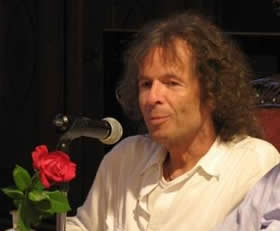
Hans Kruppa (Marl, 15 februari 1952)
De Amerikaanse wetenschapper en schrijver Douglas Richard Hofstadter werd geboren op 15 februari 1945 in New York. Zie ook alle tags voor Douglas Hofstadter op dit blog.
Uit: Metamagical Themas: Questing for the Essence of Mind and Pattern
„On self-reference
Before going further, I should explain the term “self-reference.”
Self-reference is ubiquitous. It happens every time any one says “I” or “me” or “word” or “speak” or “mouth”. It happens every time a newspaper prints a story about reporters, every time someone writes a book about writing, designs a book about book design, makes a movie about movies, or writes an article about self-reference. Many systems have the capability to represent or refer to themselves somehow, to designate themselves (or elements of themselves) within the system of their own symbolism. Whenever this happens, it is an instance of self-reference.
Self-reference is often erroneously taken to be synonymous with paradox. This notion probably stems from the most famous example of a self-referential sentence: the Epimenides paradox. Epimenides the Cretan said, “All Cretans are liars.” I suppose no one today knows whether he said it in ignorance of its self-undermining quality or for that very reason. In any case, two of its relatives, the sentences “I am lying” and “This sentence is false”, have come to be known as the Epimenides paradox or the liar paradox. Both sentences are absolutely sell-destructive little gems and have given self-reference a bad name down through the centuries. When people speak of the evils of self-reference, they are certainly overlooking the fact that not every use of the pronoun “I” leads to paradox.“
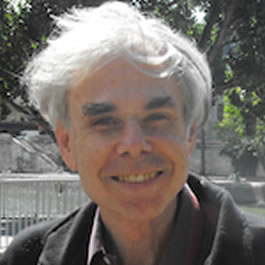
De Duitse schrijfster, critica en presentatrice Elke Heidenreich werd geboren op 15 februari 1943 in Korbach. Elke Heidenreich viert vandaag haar 70e verjaardag. Zie ook alle tags voor Elke Heidenreich op dit blog.
Uit: Mit oder ohne Knochen?
„Oft versteh ich se nich, de Welt. Früher konntich immer alles sofort erklären, aber datt läßt auch nach, Sie, seit einige Zeit binnich richtich mit mein Latein am Ende, un ich sach Ihn’ eins: wenn Else Stratmann schon de Welt nich mehr versteht, dann doch SIE ers recht nich, da machense sich ma nix vor. Kuckense, dies Schernobill zum Beispiel, nä. Watt sollich da noch groß zu sagen? In zwanzich Jahre kippen wer alle wegen Krebs ausse Socken, un dann willet widder keiner gewesen sein, un der Strauß sacht, wir könn ja ganix dafür, wär ma widder tüpisch der Russe, un der machtatt auch bloß, damit wer hier de rotgrüne Koalition kriegen, un da wär dem Russe, so wie er den Russe kennt, un er würde den kennen, da wär dem aunnoch en zweites Schernobill recht.
Da muß man auch ersma drauf komm.
Humor hatter ja, der Mann, der Störfaktor, der GAU aus Bayern, der. Er waatet bloß noch, sachter, datt bei de Demos in Wackersdorf un Brockdorf, datta de Albanier mitmaschieren.
Un der Verband vonne Kernkraftbefürworter sacht, also datt wär richtich furchba, watt mitties Thema
gezz fürne Pollitisierung stattgefunden hätte – ja, Pech, nä, sonz wär Schernobill auffe Seite «Buntes aus alle Welt» erschienen.
Auch wegen den Kardinal Höffner versteh ich die Welt nich mehr. Der is plötzlich gegen Atom! Also, datt heißt, er is fürm ungeborenen Leben, datt warer als Kirche ja immer, nä, aber seit Schernobill weißer, dattie Strahlen datt ungeborene Leben schädigen, un datt daaf natürlich nich sein, un nu isser dagegen … ich seh schon, dattie CDU noch de treusten Wähler verliert, wenn der Höffner gezz auch bei Wackersdorf mitzieht, dann giltet nachher noch als Prozession un nich als Demonstration, untie Pollezei daaf nix machen, wär ja zu schön!“
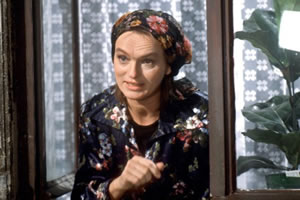
De Griekse schrijver en zakenman Demetrius Vikelas, ook bekend als Bikelas werd geboren in Ermoupoli op 15 februari 1835. Zie ook alle tags voor Demetrius Vikelas op dit blog.
Uit: The Plain Sister (Vertaald door L.E. Opdycke)
„The night before poor Mr. Plateas had been reading “The Bell” of the poet of Leucadia,–that pathetic picture of the enamored young sailor, who, on returning to his village, throws himself into the sea to reach more speedily the shore, where he hears the tolling knell and sees the funeral procession of his beloved, and as he buffets the waves is devoured by the monster of the deep. The poetical description of this catastrophe had so affected him that he afterwards attributed his misadventure to the influence of the poet’s verses. If he had not read “The Bell” that night, he would not have mistaken for a shark the urchin that swam under him, for it was not the first time that mischievous boys had amused themselves by plunging under the professor’s broad shoulders; but he had never been frightened before, while to-day this poetic recollection nearly cost him his life.
Fortunately Mr. Liakos was taking his bath near by, and when he saw the professor disappear in that extraordinary fashion, and the circles widening on the surface, he at once understood what had happened.
Swimming rapidly to the spot, he dived down, managed to grasp the drowning man, dragged him to the surface, and brought him ashore unconscious. Thanks to these prompt measures, Mr. Plateas came to himself,–with great difficulty, it is true, but he finally did come to himself; and there on the shore of the sea he made a double vow: never again to go into the water, and never to forget that he owed his life to Mr. Liakos.“
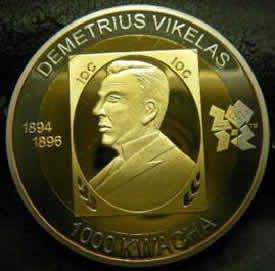
Demetrius Vikelas (15 februari 1835 – 20 juli 1908)
Zie voor nog meer schrijvers van de 15e februari ook mijn vorige blog vanvandaag.
